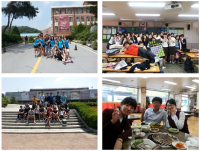Recent studies focus on Metabolic Equivalent Task (MET) to measure levels of and areas of peoples’ physically active lifestyle because MET more readily translate peoples ’subjectively perceived physicality into standardized scores. MET also allows researchers to clearly understand the relationships between peoples’ physicality and psychological variables. Thus, the purpose of this study was to understand the levels of and areas of MET among Korean middle school students and to analyze the relationships between MET scores and physical self-efficacy. A total of 278 questionnaires were analyzed using SPSS 18.0. Exploratory factor analysis, descriptive analyses, and regression analyses indicated that middle school students’ physically active lifestyle occurred in the order school, leisure, housework, and transportation areas. Female students did more physical activity in the areas of housework and transportation, compared to male students. In contrary, male students did the majority of physical activity in the areas of school and leisure. Physical self-efficacy affected students’ MET scores, especially for vigorous intensity activity. With regard to gender differences, physical self-efficacy affected male students’ MET scores in the area of leisure while female students’ MET scores were affected in the areas of school and housework. The results were discussed in light of methodological and pedagogical perspectives, and future research suggestions were provided in the discussion.
Purpose The aim of this study was to examine how middles school students in physical education class perceived relations between parental and teacher’s autonomy support, enjoyment, self-efficacy, academic effort, and P · E class flow. This study also investigate the mediating effects of enjoyment, self-efficacy, and academic effort on the relations between parental autonomy support and P · E class flow and between teacher’s autonomy support and P · E class flow. Methods For this study, 323 middle school students completed surveys to measure their perceptions of parental and teacher’s autonomy support, enjoyment, self-efficacy, academic effort, and P · E class flow. SPSS 24.0 was used to calculate descriptive statistics, reliability, and correlations. Amos 22.0 was utilized for confirmatory factor analysis, convergent validity, discriminant validity, and structural equation modeling. Additionally, 2000 bootstrap samples were requested for the mediation effect analysis. Results First, parental autonomy support was positively predictive of enjoyment and self-efficacy. Second, teacher’s autonomy support positively influenced enjoyment and self-efficacy. Third, enjoyment and self-efficacy positively affected academic effort. Forth, academic effort was positively related to P · E class flow. Fifth, there were partial mediating effects of enjoyment, self-efficacy, and academic effort on the relationship between parental autonomy support and P · E class flow. Lastly, there were partial mediating effects of enjoyment, self-efficacy, and academic effort on the relationship between teacher’s autonomy support and P · E class flow. Conclusions The study found that teachers' autonomy support was stronger predictive of student’s P · E class flow in physical education class than parent's autonomy support was. The finding is meaningful in that it is worth providing and utilizing practical knowledge from an educational perspective.

This study was to verify the structure of efficacy related to performance perceived by short-track athletes when playing a match. Therefore, 50 players answered open questionnaires and 200 players participated in construct validity verification, a total of 250 players of short-track members of national, business and university team were sampled during the research phase. The data was analyzed through the study procedures. The results were as follows: First, efficacy structure of players during the match were categorized into three groups as game managing strategy(including course management, race control, match management and selective attention ability), psychological control ability(including positive imagery, match competition, competitive spirit, ability to handle hardship, anxiety control, and patience), and physical usage of ability(including physique, endurance, and quickness). Second, the result of the first construct validity verification through exploratory factor analysis showed 7 factors in 29 items as game management, course management, psychological control, physical use, coping with hardship, speed control and psychological stability. Finally, as a result of confirmatory factor analysis, short-track self-efficacy showed the 5 factor in 15 items except for coping with hardship and psychological stability.

Purpose The current study investigated the effects of exercise information using social network service(SNS) to identify changes of physical activity and psychological variables among inactive college students. Methods Inactive college students(30 experimental group, 30 control group) were voluntarily participated in the 12-weeks intervention. During this period, the experimental group received exercise information through SNS. And all study participants’ physical activity, stages of physical activity, self-efficacy, motivation, and perceived benefits and barriers were measured at the pre, mid and post intervention. Frequency analysis, chi-square test, 2-way ANOVA RM were conducted to analyze data obtained in the study. All procedures were performed by using SPSS 23.0. Results The exercise information intervention using SNS during 12 weeks had a positive effect on the stages of physical activity of inactive college students, and there were statistically significant differences. In addition, physical activity, perceived benefits and barriers, self-efficacy, motivation positively improved after the intervention, but there were no statistically significant differences between experimental and control group. Conclusions The present study suggests that psychological strategies using various SNS programs have positive effects for inactive college students to increase physical activity and its related psychological variables.
The purpose of this study was to examine psychological capital acquisition through Asian Games Participation. 17 of national women football players were completed Psychological Capitals Questionnair. The psychological capital consists of optimism, psychological skills, self-management, collective efficacy, and performance perception was investigated after the team call-ups and before the team-release. The data was analyzed by paired t-test. As results, Korean women football players’ collective efficient and performance perception showed a statistical significance at the beginning of the team call-ups but optimism, psychological skills, and self-direction did not show statistic significances. The team-harmony, interpersonal-management, team-power, sufficient training, trust in coach, efficient communication, and psychological football factors, which were subfactor of football players’ psychological capital, showed statistical significances. However, confidence, concentration, goal-setting, imagery, willpower, anxiety-control, mental-management, life-management, training-management, innate-behavior management, physical-management, football skills, mediative skills, and football intelligence factors did not have statistic significances. These results demonstrate that effects of mega sporting events-like experiences and psychological factors’ variability and inflexibility according to weather changes should be considered when it comes to discussion of psychological factors regarding players’ performance. It is expected that this study would be a fundamental resource for understanding of psychological influences through participations in mega sporting events and discussions about further psychological interventions for teams with environmental consideration as well as methodological developments which could measure effects of the psychological interventions.

Purpose This study tells about my life about the past time when I studied for the teacher certification examination, using autoethnography. Methods It primarily used personal memories and diaries. The collected data was analyzed by applying longitudinal coding method through technical categories. Results The finding of this study is described in a chronological order as follows. The first part is about my unstable ego formed in my puberty period just like riding a roller coaster. It mainly features the process of choosing a career path when I was in school and the important starting point that made me today. The second part describes about my life after entering the department of physical education. I joined the military only to flee from a fruitless college life where I was wearing an unbefitting mask to hide myself from the world that is completely beyond my control. In the military, I was lucky to realize how to apply my major to set up my career path by coincidence. The third part is about the process of finding a genuine meaning of being a physical education teacher through a transitional period experienced after returning to school and form a stable self. Lastly, passing teacher certification examination with undaunted struggles boosted my self-esteem and self-efficacy and solidified my self-identity in the end. In addition, it is possible to get a glimpse of the attitudes that teachers need to have for a teaching career in the last part. Conclusions What I want to say throughout my descriptive story is that preparing for the teacher certification examination itself is a great challenge as well as a courageous decision for the candidates, but it is an attainable goal if they try with all their heart.


PURPOSE This study aimed to apply a capacity building program to sport life skill leaders and to provide cases of this process. METHODS The study participants included four leaders (male=2, female= 2, Mage=37.5) who were managing a sport life skills program at a university. They participated in a capacity building program, which consisted of (a) understanding (leader seminar), (b) application (managing the sport life skills program), and (c) evaluation (leader’s self-reflection), which were conducted in eight sessions. Four leaders conducted self-evaluations using program quality assessment (PQA) during every session, and quantitative and qualitative data were collected. Qualitative data were derived using a cross-case analysis, and quantitative data were used for calculating the effect size after performing the paired t-test. RESULTS Analyzing the reported cases of sport life skill leaders, the use value of the capacity building program was identified. Furthermore, the cases reported by the four leaders enabled observation of how the leader’s capabilities were strengthened. In the paired t-test, the effect size of physical and psychological safety, appropriate structure, supportive relationship, opportunities to belong, support for efficacy mattering, opportunities for life skill building, excluding integration of family, school, and community effort, were all significant. All effect sizes were found to have “very large effects.” CONCLUSIONS The capacity building program played a positive role in strengthening the leaders’ life skill coaching capabilities. These findings have practical implications—chiefly, it is important to strengthen leaders’ or coaches’ capabilities in order to foster life skill development and transfer of student-athletes.